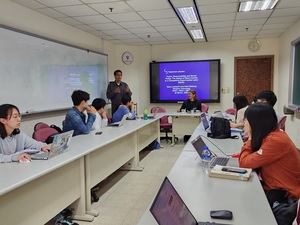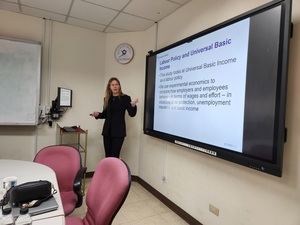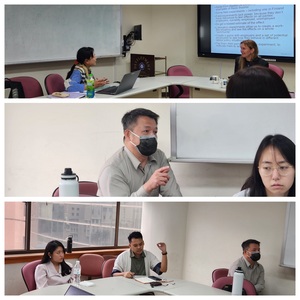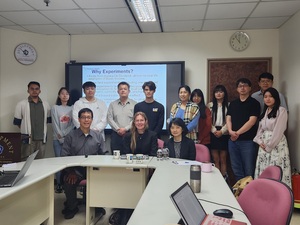IDAS x IMAS x IMES: Power, Responsibility and Social Policy: The Impact of Basic Income in a Competitive Experimental Labor Market




Date :
2024-03-29
Department :
International Doctoral Program in Asia-Pacific Studies
【Article by IDAS】
National Chengchi University’s (NCCU) International Doctoral Program on Asia-Pacific Studies (IDAS) lecture series presented Power, Responsibility and Social Policy: The Impact of Basic Income in a Competitive Experimental Labor Market, held on 26 March 2024. Dr. Katri Sieberg from Tampere University, Finland presented findings on the effect of Basic Universal Income on the labor market, a collaborative research with her doctoral student Veera Jokipalo. This lecture was held in collaboration with the International Master’s Program in Asia-Pacific Studies (IMAS) and the International Master’s Program in Applied Economics and Social Development (IMES), and hosted by Dr. Philip Liu, the Associate Dean of the College of Social Science
Dr. Sieberg’s presentation focused on how basic income can work as a labor policy. The research sought to answer this question through experimental economics where volunteers simulated the relationship between employers and employees in a labor market. Situated within a gameplay three treatments altered the incentives: the presence of basic universal income, the provision of limited unemployment benefits, and nothing at all as the control. These treatments were observed in their effect on wages, effort, and willingness to return to work. The research aimed to address a research gap in the literature on basic income, particularly, its effect on employed people.
The research findings were that basic income’s impact on wage and effort can be nuanced. Results of the experiment showed that out of the three treatments, basic income had a mid-level effect on wage and effort across all wage levels. According to Dr. Sieberg, basic income had no effect on the labor supply in their experiment, meaning it did not disincentivize work. The significance of Dr. Sieberg’s research focuses on the creation of a fair and effective labor policy that encourages workers to give reasonable effort, without the need to penalize them for adverse and unforeseen conditions.
In the open forum, Dr. Sieberg fielded questions on both the experimental design of the research and the wider social implications of basic income. Questions on methodology focused on the advantages and disadvantages of conducting similar experiments in the field versus in a controlled lab environment. This continued on the discussion of existing research conducted and the unintended consequences of public policy application without proper research. In terms of wider implications, Dr. Sieberg answered a question on how labor policy can create manufactured unemployment creating a system benefitting only the employers. In response, she pointed out that basic income is a fairer system that does not discourage labor, and also saves time and effort.
Dr. Sieberg's discussion on ways to study public policy through quantitative social experiments provided insight into the various methodological approaches to the study of societal issues. For a diverse audience, composed of international and local students from all three programs, the research sparked discussion on both the social and state implications of basic income. It was a great opportunity for our students to further understand the variety of contexts in studying social phenomena done in other countries.
National Chengchi University’s (NCCU) International Doctoral Program on Asia-Pacific Studies (IDAS) lecture series presented Power, Responsibility and Social Policy: The Impact of Basic Income in a Competitive Experimental Labor Market, held on 26 March 2024. Dr. Katri Sieberg from Tampere University, Finland presented findings on the effect of Basic Universal Income on the labor market, a collaborative research with her doctoral student Veera Jokipalo. This lecture was held in collaboration with the International Master’s Program in Asia-Pacific Studies (IMAS) and the International Master’s Program in Applied Economics and Social Development (IMES), and hosted by Dr. Philip Liu, the Associate Dean of the College of Social Science
Dr. Sieberg’s presentation focused on how basic income can work as a labor policy. The research sought to answer this question through experimental economics where volunteers simulated the relationship between employers and employees in a labor market. Situated within a gameplay three treatments altered the incentives: the presence of basic universal income, the provision of limited unemployment benefits, and nothing at all as the control. These treatments were observed in their effect on wages, effort, and willingness to return to work. The research aimed to address a research gap in the literature on basic income, particularly, its effect on employed people.
The research findings were that basic income’s impact on wage and effort can be nuanced. Results of the experiment showed that out of the three treatments, basic income had a mid-level effect on wage and effort across all wage levels. According to Dr. Sieberg, basic income had no effect on the labor supply in their experiment, meaning it did not disincentivize work. The significance of Dr. Sieberg’s research focuses on the creation of a fair and effective labor policy that encourages workers to give reasonable effort, without the need to penalize them for adverse and unforeseen conditions.
In the open forum, Dr. Sieberg fielded questions on both the experimental design of the research and the wider social implications of basic income. Questions on methodology focused on the advantages and disadvantages of conducting similar experiments in the field versus in a controlled lab environment. This continued on the discussion of existing research conducted and the unintended consequences of public policy application without proper research. In terms of wider implications, Dr. Sieberg answered a question on how labor policy can create manufactured unemployment creating a system benefitting only the employers. In response, she pointed out that basic income is a fairer system that does not discourage labor, and also saves time and effort.
Dr. Sieberg's discussion on ways to study public policy through quantitative social experiments provided insight into the various methodological approaches to the study of societal issues. For a diverse audience, composed of international and local students from all three programs, the research sparked discussion on both the social and state implications of basic income. It was a great opportunity for our students to further understand the variety of contexts in studying social phenomena done in other countries.


 Fax:886-2-29379611
Fax:886-2-29379611